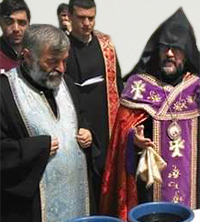
The role of the Armenian Church, and religious organizations in general, in building a civil society is more than relevant today. However, strange as it may seem, this issue is generally absent from the public debate.
During the previous government (before 2018), the Armenian Apostolic Church claimed to be a state church (at least the clergy and government officials often used the phrase “state church”). Representatives of the church were always present at important state ceremonies, and the Catholicos was in fact considered the second ceremonial figure in the country after the president. Numerous articles were also published in the press about other religious organizations. They also, regardless of their will, became actors in public and political life. The reason was clear: the exaggeration of the role of the “official” church led to a certain interest in “rival” religious organizations.
After the change of power, when the church, and religion in general, was pushed out of political and state life, everyone seems to have forgotten about their existence. Religious organizations have disappeared from the news. In any case, there are rare publications in the field of information, and if there are, only in the context of this or that political event.
This proves that in the past, when the issue of religious freedom in Armenia was a rather acute and urgent topic, it was an artificial discourse and the society, in fact, is quite tolerant. Moreover, very few people are interested in who has what kind of faith, and the previous “passions” on this topic were artificial. The question arises, what is the role of religious entities as organizations in the life of the society?
Do churches, or religious communities, some of which are quite crowded, have a role to play in public life or not, or should they claim a public role?
The Armenian Apostolic Church, like other traditional churches, has always tried to get state sponsorship, instead offering its services. It was the scheme of centuries-old cooperation between the church and the state, and in that sense the Armenian Church is not unique. However, in the future, from the time of secularization, churches and religious communities are trying to find their place in the life of the society as independent structures and communities.
This process started too late in Armenia. During the Soviet era, religious institutions were deprived of their independence and were completely controlled by the state. After the collapse of the Soviet Union, the church became a national symbol, and the state began to demand the restoration of lost prestige and property in the Soviet era. The state also needed the support of the church to increase its influence on believers. It was a mutually beneficial cooperation. Now the situation has changed, the church and the society are facing each other, without a mediator — the state.
In the world, as in Armenia, transformations are accelerating. The structure of societies and states, the field of information, priorities, the role of institutions are changing. In this case, it is difficult to imagine that the relationship between church, state and society can remain the same, especially in traditional sense.
The church must enter into a dialogue with the society, offer a new model of relations, and the society must find an independent structure in the entity of the church, which, in addition to being an organization providing ritual services, will be perceived as an important component of civil society. It is possible to be perceived first and foremost as a guardian of moral values. This applies to other religious organizations as well.
In the post-Soviet period, the public had an idea that civil society organizations were the unit of civil society. It is an incomplete perception. Civil society is a broader organization made up of independent and self-sufficient organizations and unions: trade unions, artistic, artisanal, and religious organizations. We do not have such a civil society.
Both the church and the society are not ready for the new horizontal relations, there is no such question even on public platforms.